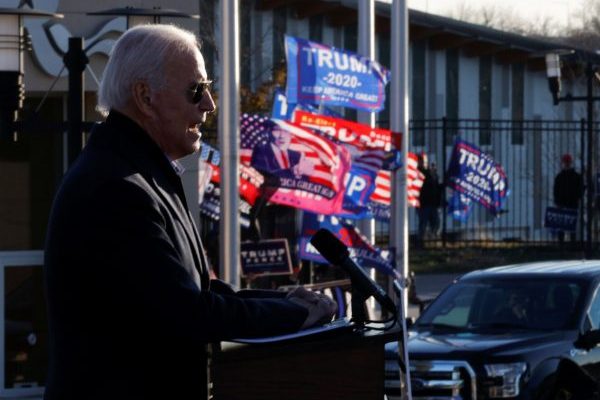Biden in Asia

Joe Biden’s immediate priority following his inauguration on 20 January 2021 will be domestic, difficult and crisis-driven.
His challenge will be to reduce the spread of COVID-19 without worsening unemployment, triggering a recession or yielding to obstruction by Donald Trump’s fans in Congress or by his right-wing judicial appointees. The new administration will be turned further inwards by the need to re-professionalise agencies that Trump has had four years to politicise and corrupt.
Biden will begin his foreign policy by re-entering the world. Trump pulled the United States out of the Intermediate-Range Nuclear Forces Treaty, the Paris Agreement, the Iran nuclear deal, the Trans-Pacific Partnership (TPP), the UN Human Rights Council, UNESCO and the World Health Organization. He threatened withdrawal from the World Trade Organization and criticised NATO and the G7.
The Biden administration may not be able or inclined to reverse all of these exits — reviving the Iran deal and joining the revised TPP are notably problematic. But all else being equal, ‘America First’ glossed as ‘America Alone’ will be jettisoned in favour of what might be called ‘America Together’ — institutionalised cooperation towards shared goals with like-minded partners around the world.
In the course of excoriating ‘globalists’, Trump has embarrassed or alienated many foreign counterparts. European leaders have been especially angered by insulting disregard, so Biden will want to restore comity with them. They and heads of other developed countries such as Japan can also help him address key transnational challenges — global infection, global warming and global competition in trade and technology.
Among Asian states, the one that will challenge Biden most is China — a semi-developed country, the origin of COVID-19, the world’s leading emitter of CO2 and a would-be global digital power. Not to mention military clout and repressive-cum-expansionary behaviour.
Biden’s approach to China and Asia will depend in part on advice he is given by the cadre of foreign-policy advisers he assembled over his 2009–2017 vice-presidency and his earlier chairmanship of the Senate Foreign Relations Committee.
Based on preliminary signs of what that advice would be and what Biden would himself prefer, his administration’s likely statements and steps can be summarised in one word: internationalisation. Biden would prioritise enlisting outside powers in efforts to achieve US objectives in the wider world.
Internationalisation warrants support on several grounds. Domestically, it responds to the concern shared by many, both in Trump’s base and on the Democratic left, that the United States is overcommitted abroad. Sharing burdens with partners can be portrayed as an optimal position between badgering them as in Trump and over-involving the United States in their affairs.
‘America Together’ will acknowledge the reality of stressed and stretched US resources and the need to augment them with help from partnering countries in addressing shared concerns — the pandemic, the environment, poverty and security, for example. In East Asia, such a policy could encourage and help countries that are willing to work with China on fair terms but unwilling to be bullied or bought into a region remade in Beijing.
In this context a Biden administration can be expected to revalidate and elevate the non-partisan profession of diplomacy following egregious abuse under Trump. The centre-left Center for American Progress, for example, has recommended enlarging and empowering the State Department in ways that would, perhaps controversially, reduce the Department of Defense’s role.
Cognate are remarks regarding a Biden administration’s likely policy on the South China Sea made recently by Daniel Russel, a career foreign service officer and former Asia adviser to President Obama. Biden’s policy, he said, would include ‘not just sending warships’ — a reference to US Pacific Command Freedom of Navigation Operations (FONOPs) in the South China Sea — but ‘diplomacy, engagement and participation with ASEAN and regional forums’.
China’s behaviour in Xinjiang, Hong Kong, the South and East China seas and on Taiwan has prompted global pushback and led many US policy advisers to toughen their China positions.
Biden’s Asia team will not readily revert to the softer stance of the Obama years, but the team’s success in Asia will depend on its and Biden’s ability to do several divergent if not incompatible things simultaneously. They will need to work in tandem with other countries to oppose China’s predatory expansion, interference and repression, while selectively supporting China’s participation in multilateral efforts to defeat contagion, mitigate warming and improve human welfare.
Internationalisation is not a panacea. Multilateral diplomacy will fail if it becomes an end in itself, as in the caricature of ASEAN as an Asian NATO — ‘No Action, Talk Only’. Conducting international meetings virtually on screens will limit the exercise of personal empathy that Biden is known for. Unregenerate Trumpians will do what they can to delegitimise global outreach as kowtowing to outsiders.
Biden’s Republican opponents will enlarge their minority in the House of Representatives and seem likely to retain their majority in the Senate. Biden will need their cooperation if ‘America Together’ with other countries is to work.
Internationalisation will not restore lost trust in the United States unless the new administration manages to put the United States’ own house in order, showing the world that the years under Trump were anomalous — not a harbinger of worse to come.
This article was published by The East Asia Forum.
Donald K Emmerson heads the Southeast Asia Program at the Shorenstein Asia-Pacific Research Center, Stanford University. His latest publication is The Deer and the Dragon Southeast Asia and China in the 21st Century.













